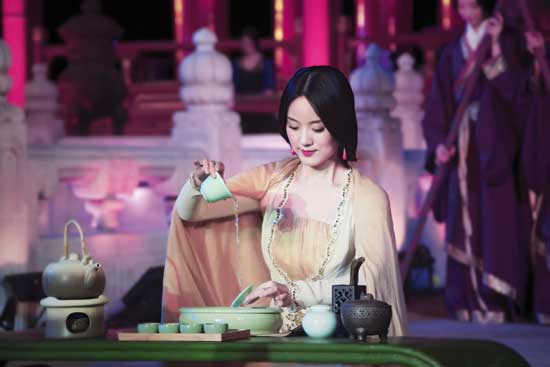New Elegant Music inherits Chinese culture on stage
Classical performer Ha Hui's New Elegant Music world tour Sixteen Songs From Among the Blossoms played at Beijing Imperial College last month, with her next stop, Israel and then, the world.
"New Elegant Music presents traditional Chinese music, with lyrics from classical literature works like those by Confucius in a contemporary way, easy for audiences today to understand and accept," Ha told the Global Times. She said that the show is not just about music itself, but also the staging, lighting, costumes and traditional performances.
 |
|
Ha Hui performing in Beijing. [Global Times] |
At the first sound of a bell in the distance, the stage lit up. Forty performers in traditional Han-styled clothes rushed forward and took an opening bow, moving from the back of the stage to the front. A single beam of light was cast on the middle gate and Ha walked out, dressed in Han-style clothes with double-bird embroidery on blue silk.
As drumming began, the chorus performed the famous traditional Chinese Drum Dance to Ha's song "Your Collar." Every beat and note from the stage echoed traditional Chinese culture.
"When I perform the song 'Tea Scent,' I also conduct a traditional tea ceremony with formal courtesies," Ha explained, adding that she created the New Elegant Music genre to be all about presenting traditional Chinese culture from different periods of time.
She also incorporates Chinese Confucianism, with most of her lyrics drawn from Confucius' works such as The Analects. "My music is to restore classical music of different dynasties throughout China's thousands of years' history, but more importantly, to resume the nation's journey along the path of traditional values and revitalize time-honored cultural ideals in China."
In Ha's understanding, the most basic and important element of Chinese traditional values and manners is family. She said that China's historical family traditions must be preserved and passed down from generation to generation in order to promote family unity and the concepts of filial duty, ethics and morality.
"A large part of my music is for family use, like classical family dinner ceremonial music, family wedding ceremonial music and family music," Ha said.
 0
0 







Go to Forum >>0 Comments